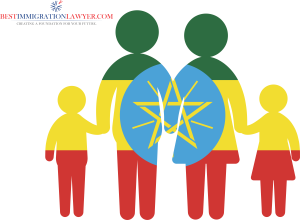TEMPORARY PROTECTED STATUS EXTENDED TO ETHIOPIANS IN THE UNITED STATES
This month the United States Department of Homeland Security announced that it has designated the nation of Ethiopia for Temporary Protected Status (“TPS”). A country can be designated for TPS if the conditions in that country include armed conflict, environmental disaster or extraordinary conditions that otherwise make life dangerous in that country. What this means in practical terms is that persons from Ethiopia currently residing in the United States as of October 20, 2022 can remain here for 18-months without fear of overstaying a visa or being deported. That 18-month period can be extended if the TPS gets extended. The rationale behind TPS is that persons from nations that have been designated for TPS status cannot return home without being placed in danger and therefore they must be allowed to remain in the United States for a temporary period of time for their protection.
Currently, Ethiopia’s Tigray region has witnessed an ongoing civil war since 2020 that has brought tremendous suffering and danger to the region. In addition to this civil war, the country is also experiencing food shortages, dangerous environmental conditions and other hardships that make life dangerous. In recognition of this, the Secretary of DHS, Alejandro Mayorkas, recently commented that “Ethiopian nationals currently residing in the U.S. who cannot safely return will be able to remain and work in the United States until conditions in their home country improve.” This news has been met with relief in the Ethiopian community and especially among those facing the prospect of overstaying a visa versus returning home to dangerous conditions.
country is also experiencing food shortages, dangerous environmental conditions and other hardships that make life dangerous. In recognition of this, the Secretary of DHS, Alejandro Mayorkas, recently commented that “Ethiopian nationals currently residing in the U.S. who cannot safely return will be able to remain and work in the United States until conditions in their home country improve.” This news has been met with relief in the Ethiopian community and especially among those facing the prospect of overstaying a visa versus returning home to dangerous conditions.
 Immigration Lawyer Blog
Immigration Lawyer Blog











 country is also experiencing food shortages, dangerous environmental conditions and other hardships that make life dangerous. In recognition of this, the Secretary of DHS,
country is also experiencing food shortages, dangerous environmental conditions and other hardships that make life dangerous. In recognition of this, the Secretary of DHS, 


